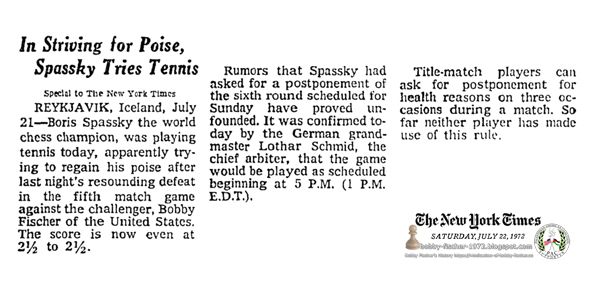New York Times, New York, New York, Saturday, July 22, 1972 - Page 29
In Striving for Poise, Spassky Tries Tennis
Reykjavik, Iceland, July 21—Boris Spassky the world chess champion, was playing tennis today, apparently trying to regain his poise after last night's resounding defeat in the fifth match game against the challenger, Bobby Fischer of the United States. The score is now even at 2½ to 2½.
Rumors that Spassky had asked for a postponement of the sixth round scheduled for Sunday have proved unfounded. It was confirmed today by the German grandmaster Lothar Schmid, the chief arbiter, that the game would be played as scheduled beginning at 5 p.M. (1 p.m. EDT).
Title-match players can ask for postponement for health reasons on three occasions during a match. So far neither player has made use of this rule.
New York Times, New York, New York, Saturday, July 22, 1972 - Page 29
Russians Puzzled
Moscow, July 21—“You're asking about the blunder?” the young Russian chess enthusiast said. “I think the biggest blunder Spassky ever made was to sit down opposite Fischer to play chess.”
The young Russian was commenting at the Central Chess Club on the uproar stirred abroad by yesterday's defeat of the Soviet champion.
The comment was typical of many Russian players who never thought Spassky had much of a chance against the American and took the quick defeat of the Russian in stride.
Chess commentators here were puzzled by Spassky's error, but there were no personal recriminations as there sometimes are when Soviet players lose.
The match now stands at 2½ to 2½.
New York Times, New York, New York, Saturday, July 22, 1972 - Page 29
At U. N., Blitz Doesn't Always Mean War by Israel Shenker
United Nations, N.Y., July 21—The United Nations plays an important role on the international chessboard, and international chessboards play an important role at the United Nations.
Every lunch hour the boards are set up in the ground-floor lounge of the Secretariat Building here. Then the members of the United Nations Chess Club—a voluntary nonagency with no permanent members, no veto rights, and precious few obligations to anything except the clock that will summon them back to their jobs upstairs—meet to test strategy and tactics.
Lev Maksimov of the Soviet Union, who works in the United Nations information service, sat brooding at Board 1 today, playing black. Opposite him sat Abelardo Perez of Spain, who works in the translation service. They were playing blitz chess, in which each player gets five minutes in which to complete all his moves. If the game has not ended by the time one player has used his five minutes, he loses.
“I'm trying to play like Spassky,” Mr. Maksimov said, “although nobody wants to play like Spassky after yesterday's game.” He hurried over his words, as if to save time.
Studied Neutrality
Boris Spassky is the world's champion, who is defending his title against Bobby Fischer and who blundered into defeat in yesterday's game. At the United Nations, each move by the Russian champion and the American challenger is carefully analyzed, usually with studied neutrality.
Suddenly, Mr. Perez moved a pawn onto the seventh rank—immobilizing Mr. Maksimov's king. Mr. Maksimov sat back startled. “Spassky blunders again?” chortled a spectator, throwing neutrality to the winds, and, indeed, Mr. Maksimov's fate was sealed.
“He has a better reaction than me,” the loser said, referring to Mr. Perez. “He's younger.” Mr. Maksimov is 44, and Mr. Perez is 30.
“No matter how good you play strategically, it is easy to make a tactical blunder,” Mr. Maksimov said.
Likened to U.N.
“Chess can be scientific and technical, and suddenly you make a tremendous blunder, just like the U.N.” he said. “Happily the U.N. rarely blunders—it's a very steady, conservative player, good without being too brilliant. When you are too brilliant, you can make big blunders.”
“The U.N. is like an academic player. It will always be ready for a draw instead of pushing the game to a finish.
Caption: Lev Maksimov, Soviet Union, stops his clock as Abelardo Perez, Spain, reaches to make his move in blitz chess game at the United Nations chess club, while kibitzers struggle to remain neutral.
Press and Sun-Bulletin Binghamton, New York Saturday, July 22, 1972 - Page 5
It Matters Not How Big the Board--or Boy
Simultaneous Play--Ten-year-old Tom Cleary moves against Harold C. Evans, former president of New York State Chess Association, who played 28 games at once in a demonstration at Binghamton YMCA last night. Tom, whose father looks on at left, was one of four among Evans' opponents who played to a draw. The rest lost.
SOFT CHESS—Paul Ulmer, 12, a chess veteran of three years, battles Evans with fist-size chess pieces on a carpet board. Evans discussed the Bobby Fischer-Boris Spassky match and Fischer's early chess play at regular meeting of YMCA's Chess Club.
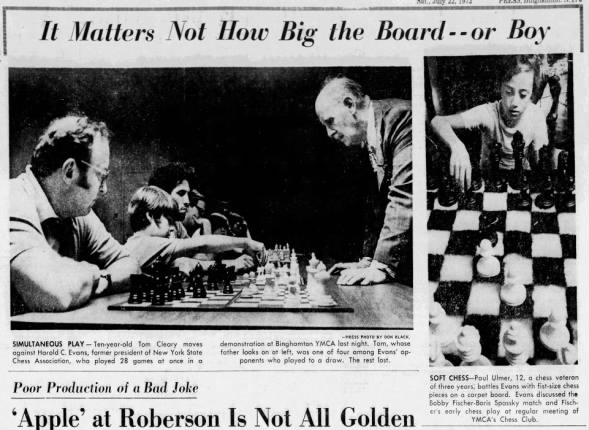 It Matters Not How Big the Board--or Boy 22 Jul 1972, Sat Press and Sun-Bulletin (Binghamton, New York) Newspapers.com
It Matters Not How Big the Board--or Boy 22 Jul 1972, Sat Press and Sun-Bulletin (Binghamton, New York) Newspapers.com
The Honolulu Advertiser Honolulu, Hawaii Saturday, July 22, 1972 - Page 42
The Readers Always Write:
Dear sir: Thanks for giving us the complete plays in the Iceland chess tournament. Please keep it up. Signed, Lewis E. Walkup.
Dear Sir: For the first time in our lives we've been getting as much chess news as we like in the Advertiser. And the play-by-play in the Spassky-Fischer match makes our day complete. Signed, Robert Fernandez.
Dear Sir: I'd like to subscribe to the Advertiser because you carry all the chess news… Signed, Helen Cavaco.
Editor's note: Hold it. That's going a little too far.
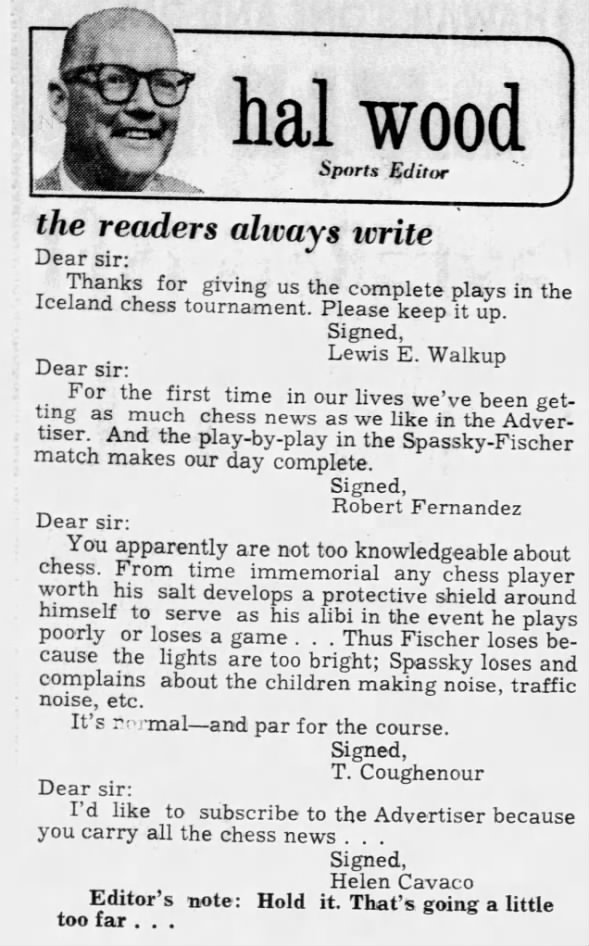 Sports Editor 22 Jul 1972, Sat The Honolulu Advertiser (Honolulu, Hawaii) Newspapers.com
Sports Editor 22 Jul 1972, Sat The Honolulu Advertiser (Honolulu, Hawaii) Newspapers.com
The Honolulu Advertiser Honolulu, Hawaii Saturday, July 22, 1972 - Page 42
Fischer Near Chess Victory
Reykjavik, Iceland (UPI)—Challenger Bobby Fischer was “feeling on top of the world” yesterday following his second win over world chess champion Boris Spassky of Russia and at least one chessmaster said the American could wrap up the championship with one more win.
“Spassky is kaput” said Najdorf of Argentina. “Bobby gave him two games in advance by objecting to the ([disruptive men operating]) the cameras yet he slaughtered him in game three and five. Another win for him and Spassky might just as well go home.”
YUGOSLAVIA'S Svetozar Gligoric, the senior and most merited grandmaster attending the championship match said Spassky's loss of the fifth game Thursday was due to an uncharacteristic mistake, and that the Russian champion should not be counted out yet.
“The mistake Spassky made in his 27th move been playing well. But do not underestimate him,” Gligoric said.
Fischer's win over Spassky Thursday evened the two met at 2.5 points each going into Sunday's game, scheduled to begin at 5 p.m. (1 p.m. EDT).
Spassky needs 12 points to retain his title and Fischer needs 12.5 points to take it away.
The Sydney Morning Herald Sydney, New South Wales, Australia Saturday, July 22, 1972 - Page 1
How To Beat The World Champion...
in one easy move
Bobby Fischer, America's chess genius, was playing black in the position above and about to make his next move. Boris Spassky, Russia's world champion, had amazingly just made the kind of error a beginner makes. And with one devastating move Fischer gained such an advantage that Spassky resigned immediately.
It happened, to a roar of applause from the spectators, in the fifth game of the world title match, played yesterday in Reykjavik, Iceland. It brought Fischer level with Spassky on 2½ points.
Fischer needs 12½ points to wrest the title held by the Russians ever since World War II. Spassky needs only 12 points to stay champion.
Fischer's winning move is given on Page 4, with the latest report and game details.
The Sentinel Carlisle, Pennsylvania Saturday, July 22, 1972 - Page 2
Fischer Bothers Spassky
Reykjavik (UPI)—World chess champion Boris Spassky has fled to the seclusion of a downtown penthouse and canceled all appointments amid reports from Russian sources that he is irritated with the American challenger, Bobby Fischer.
The Rev. William Lombardy, Fischer's second, said Friday, “Spassky is so ravelled that if he doesn't come around by the sixth game Bobby is going to steamroll him. Spassky has not been himself here. The match Sunday will go two ways—either he will break down or find hidden reserves and come back.”
Fischer defeated Spassky Thursday night to draw even at 2½ points after five matches in the 24-game series. The sixth match begins Sunday afternoon.
Spassky's aides took the world champion to a downtown penthouse apartment for 48 hours. All Spassky's appointments and excursions were canceled, Russian sources said.
Spassky, who had put up with Fischer's late arrivals, is now irritated with the challenger's behavior at the chess table. He objects to the way Fischer rises from his chair after making a move, the way he sometimes sways back in the chair, and when he crosses his legs he continually wiggles one foot, the sources said.
“It is a fact Spassky has seldom played so poorly in all his time. Spassky is used to playing against other Russians and obtaining easy draws after 16 to 20 moves. Well, that is not Bobby. He attacks all the time and he has this burning desire to win. Spassky is a very worried man. There is no plan in his game so far,” Lombardy said.
Rutland Daily Herald Rutland, Vermont Saturday, July 22, 1972 - Page 2
Clucking Heard at Moscow Chess Club by Theodore Shabad
Moscow—“You're asking about the blunder?” the young Russian chess fan said. “I think the biggest blunder Spassky ever made was to sit down opposite Fischer to play chess.”
The blond Russian had stepped out into the cool air on the balcony of the Central Chess Club and was commenting on the uproar stirred abroad by the defeat of Boris Spassky, the Soviet champion, in the fifth game of the world title match against Bobby Fischer of the United States.
The comment was typical of many Russian chess players who never though Spassky had much of a chance against the American and who were therefore taking Thursday's defeat of the Russian in Reykjavik in stride. The score is now even at 2.5 to 2.5.
Inside the sweltering playing rooms of the chess club, others were huddled in groups around boards and were running through the moves of the fifth game on the basis of reports in the evening papers.
Players moved the pieces over the board more rapidly than a novice could follow and then suddenly slowed as they approached the 26th move, in which Spassky shifted the white bishop in what Tass, the official press agency, termed a “strange maneuver.”
The agency attributed the error to a lack of time for thinking and “maybe to fatigue caused by strenuous playing.” ([Or better, the strain of Moscow breathing down Spassky's back]) Spassky, by the 20th move, had taken 50 more minutes for his game than Fischer.
The young Russians looked in puzzlement at the fateful 27th move, in which Spassky committed his blunder by moving back his white queen.
“My God, he overlooked the bishop,” one of the players murmured, referring to the black piece that was promptly moved by Fischer to set the stage for inevitable defeat.
In the officially controlled media, chess commentators were equally puzzled by Spassky's error, but no one engaged in personal recriminations as sometimes happens when Soviet players lose.
Nikolai Dymarsky, a radio-television commentator who is covering the match for Soviet media in Reykjavik, said “Only five games have been played and 19 are still ahead, so that anything can happen, both pleasant and disappointing.”
Yevgeny Vasyukov, writing in the evening paper, Vechernyaya Moskava, said “Quite unexpectedly the world champion committed a gross oversight and, after Fischer's reply promptly resigned.”
“A sad finish,” Vasyukov added. “Such oversights are extremely rare in Spassky's games.”
In the regular nightly television analysis of the Reykjavik games, Yakov Damsky termed the error an “incomprehensible oversight,” adding that Spassky had committed such an error only once before in his career.
The Honolulu Advertiser Honolulu, Hawaii Saturday, July 22, 1972 - Page 25
Kuhio Beach Chess Nuts Say Fischer Will Roast Spassky by Bob Krauss
A Krauss Survey of the chess nuts on Kuhio Beach yesterday revealed that Bobby Fischer and Boris Spassky can go home. Their World Chess Championship has been decided.
It'll be Fischer 15 games to nine.
WHEN SPASSKY returns to Russia from Iceland, the Commissar in Charge of Chess may checkmate him. At the same time, Fischer will become a millionaire giving lectures on how to play chess.
You can depend on this information because it comes straight from the Chess Capital of Hawaii, the second arbor going Diamond Head on Kuhio Beach.
A GATHERING of international experts laid it on the line for me yesterday.
Guam, Tahiti, California, Kaimuki and the University of Hawaii all voted for Fischer. Only Bulgaria and the United States Marines favored Spassky.
“FISCHER WILL skunk him now. See how fast the last game went?” said Robert Sandahl of San Diego, Calif., who comes to Hawaii to play chess. “That's because he's memorized 355 of Spassky's moves. He'll win the championship 15 to 9.”
Sandahl was playing chess with Velicko Cvetkov of Bulgaria. Young Cvetkov said he worked for an airline until he broke his leg. Now he plays chess.
“Spassky has more experience,” said Cvetkov, but not very loud. “He will win.”
Lui Piliwale, an importer-exporter from Guam, said he believes Fischer has already won.
SINCE THE contest started, he's played a businessman's chess game,” said Piliwale. “He's already won most of it. He got the cameras out. He got an extra $100,000.
“Fischer has been playing this match for the past two years, building up the pot, creating interest. His confidence is so supreme that he can't help but take it.”
Clyde Nakamura, an accounting major at the University of Hawaii, had a chess board under his arm and a timer's clock in his hand.
“Fischer already has a psychological advantage,” he explained. “Although the match is even it's as if Fischer won an extra game because he forfeited one to Spassky.
“His style has changed. Before, he played a much riskier game. Now he plays more solid and makes fewer errors.”
A RETIRED businessman predicted that Fischer would become an overnight millionaire after the match ends.
“He'll go down in history as the greatest one-man promotion team ever,” said the businessman. ‘If he wins, he'll be a millionaire on tours and speeches alone. I think somebody's behind him thinking up these things.”
Real estate broker Homer Winnagle, who was replaying the last Fischer-Spassky match with physics student Bob Glover, said Fischer will win.
Marine Cpl. Douglas Carlson, who comes to town from Kaneohe Marine Air Base on his days off to play chess, said he's for Spassky.
“FISCHER MAY win but I don't want him to,” said Carlson. “The Russian is a more refined player. He's been competing in world championships a lot longer and he knows what he's doing.”
The most positive expert was Albert Kalsbeek of Tahiti who said he's an etymologist researching the origin of the Polynesians through language. He was wearing a bathing suit and he carried a business card in his cap.
“Spassky has to win, otherwise they will shoot him when he goes back to Russia,” said Kalsbeek. “Incidentally, do you know how the term checkmate originated? It comes from ‘sheik match’ which means the king is dead in Persian.”
I asked Kalsbeek, “Do you play a lot of chess?”
He said he doesn't know how.
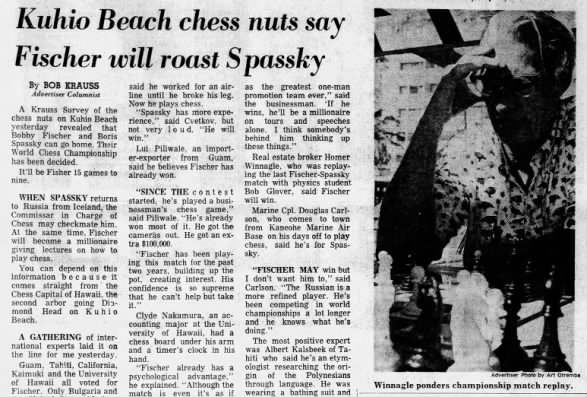
 Kuhio Beach Chess Nuts Say Fischer Will Roast Spassky 22 Jul 1972, Sat The Honolulu Advertiser (Honolulu, Hawaii) Newspapers.com
Kuhio Beach Chess Nuts Say Fischer Will Roast Spassky 22 Jul 1972, Sat The Honolulu Advertiser (Honolulu, Hawaii) Newspapers.com
The Gazette Montreal, Quebec, Canada Saturday, July 22, 1972 - Page 9
Soviet Analysts Seek New Gambit
Reykjavik (AP)—World champion Boris Spassky went fishing yesterday as his seconds put their heads together to try to save his chess title for the Soviet Union.
Said the Yugoslav chess commentator, Dimitri Bjelica, a friend of Spassky: “I am amazed he is not analyzing the game. Things are not going well for him.”
After his victory, Fischer made one of his rare sorties from his hotel room to dine at Reykjavik's chic Restaurant Norse.
In this last three games, Spassky has taken only half a point from a draw in the fourth game. Experts say he could have won then, but for a blunder on the 29th move.
Spassky's wins in the first two games of the series were little consolation. He took his first point after Fischer made a bad move and soon after resigned.
The next day Fischer did not show for the second game, angered by cameramen. That forfeit was another point for Spassky.
GLUM RUSSIANS
“Look at the Russians' faces,” said Fred Cramer, one of Fischer's advisors. “If they're smiling, Spassky's alright. If they're glum he's not.”
The Russians are looking glum, bunched in the hotel. Unlike the solitary Fischer, Spassky has a gaggle of grandmasters advising him.
There are Nikolai Krogius, grandmaster and psychology professor; Efim Geller, grandmaster and professional engineer; Isaac Boleslavski, grandmaster, and international master Ivo Nei.
Fischer has Rev. William Lombardy, a Franciscan priest and grandmaster.
“Fischer does not like to share the glory,” said ([the disgruntled]) Larry Evans, who was Fischer's second in Buenos Aires last year in his fight for the right to meet Spassky. Fischer packed Evans home after six games, when he was one point up.
“It's more difficult to advise Fischer because he knows so much,” explained Frank Skoff, upcoming president of the U.S. Chess Federation “and of course we don't have the finances to pay seconds.”
Soviet seconds are on the government payroll.
Caption Key to moves: Black and white pieces are shown here ready for play. Directional arrows show lines of power. FILE (Rows from player to player), DIAGONAL and RANK. White's files are named as coded at bottom, and ranks as numbered at the left. Black's ranks are numbered as at the right. Pawns are named by the files on which they stand but their designations change when they shift to a new file. The major pieces (outer rank) retain their designations throughout the game.
Waukesha Daily Freeman Waukesha, Wisconsin Saturday, July 22, 1972 - Page 27
Chess Played 'Old' Way by John Engelbert, Freeman Staff
CHESS HAS attracted world-wide attention because of the world championship match between Bobby Fischer of the United States and Boris Spassky of Russian now being played in Reykjavik, Iceland.
There, at Fischer's insistence, a part of one session was played in a near vacuum. Only a referee was present, and moves were relayed to spectators over closed-circuit television ([as per, Fischer's expectations; silent, automatic, stationary closed-circuit cameras in contrast to large, bulky major sports television cameras operated by crews of men who interfere with concentration]).
But the rules on playing conditions ([were laid down in stone and Soviet-Icelandic organizers have broken the rules on numerous occasions]). Sunday's session, the first part of the third game, was held in a small backstage room after Fischer threatened to boycott the match because of ([large, bulky, disruptively human-operated television cameras]) in the main hall.
A small automatic camera was installed in the backstage room ([according to the expectations Fischer had to begin with; silent, automatic, stationary equipment]) and ([naturally]) Fischer played and after Spassky objected, that game was finished Monday in the main hall.
But that isn't the way things happen at the Wisconsin House, 477 W. Main Street ([and isn't actually how things happened in Reykjavik, Iceland, either, but neglectful journalism, pipelined from the remote, isolated match near the north pole, where even satellite communications are impossible.])
There it is played as “good old-fashioned chess” among members of the Waukesha Chess Club. It has been played this way since 1963 on all but the first Thursday of each month.
Old-fashioned chess is the kind played in Europe, club president Remy DeNeve, 14160 Forest View Lane, Brookfield, says “with maybe a glass of beer, people looking over their shoulders,” and club members challenging each other in bistros and rathskellars.
Attendance varies, and even in so noble and ancient a game as chess, there is the possibility a wife may call the tavern looking for, well, anyone.
The language of the game, to the uninitiated, is arcane as a witch's chant. Addict's talk freely of Kt-KB3 followed by P-QB3 when, as they often do, they replay games played by masters and champions.
Four players started the club that meets under conditions Fischer would tolerate even less than those set in Iceland.
Meeting in the fall of 1963 were Arvid Johnson of W275-N6646 Moraine Drive, Sussex; Harold Dalgren, 328 Bidwell Ave., and Kenneth Larson, 514 Gascoigne Drive, both Waukesha and DeNeve.
Among new members added later was Albert T. Breecher, who really got the club organized with simultaneous games between 22 players and Charles Weldon of Milwaukee. Weldon was the 1963 state champion and later won the U.S. amateur tournament.
Another simultaneous game involving Bill Williams, a ranking player in the state, was played. Williams demolished his opponents in one set, winning 14, losing none and drawing none. In a second set of games he won 10, lost two and drew one. Williams has been a frequent visitor to the club.
The club holds several tournaments a year, and has a traveling trophy for its club championship. John Ruprecht, 1918 Highland Avenue; has won each local tournament since 1967.
On a recent Thursday DeNeve, Larson and his son Eric, Joe Chiello, and enough others to make it an 8 p.m. to an 11 o'clock or midnight session showed up at the Wisconsin House.
Chess is an intense game. Rooks or castles move perpendicularly to the sides of the board, bishops diagonally, knights erratically, the queen any which way, and with king and pawns having very limited moves.
The number of possible moves in a chess game runs into many millions, so it's easy to understand why it takes time to choose the proper moves.
Which may be why a special clock to time moves is often used. Each player gets a certain amount of elapsed time to complete a certain number of moves.
That Thursday was the actual opening of the Fischer-Spassky match. It was replayed in the backroom of the Wisconsin House, DeNeve playing the Spassky moves, “Because I played the Fischer game at noon during lunch.”
The strained atmosphere surrounding the Fischer-Spassky match wasn't apparent here. A flashbulb popped as a picture was taken. “Good thing Fischer isn't here,” Chiello said. ([And good thing Soviet-Chester Fox, Inc., isn't present as his agency was personally responsible for fulfilling the USSR's wish to bury the match, barring ALL CAMERAS from the playing hall, after making a 'secret deal' with Soviet-Icelandic organizers to suppress all photography rights to the match to successfully limit media coverage of the match of the century, a move which Robert Fischer, and world journalists, opposed on grounds of Constitutional Laws.])
The club is visited often by first-rank players, among them William Martz, a Hartland attorney who has won the state title several times.
New members are always welcome and the dues are nominal. Wisconsin House charges nothing for the use of its backroom, and $5 a year takes care of the whole thing. After five years a member is paid up for life.
Intellectual exercise could hardly come cheaper, while satisfying competitive instincts as well.
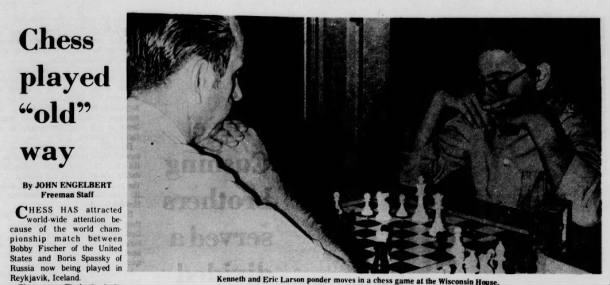 Chess Played 'Old' Way 22 Jul 1972, Sat Waukesha Daily Freeman (Waukesha, Wisconsin) Newspapers.com
Chess Played 'Old' Way 22 Jul 1972, Sat Waukesha Daily Freeman (Waukesha, Wisconsin) Newspapers.com
The Napa Valley Register Napa, California Saturday, July 22, 1972 - Page 6
History proved Robert J. Fischer and Boris Spassky were professionals and developed a life-long friendship, in spite of such flawed attempts by the Soviet Union's long-arm media machinery to project their own poor sportsmanship and character defamation on to Robert J. Fischer.
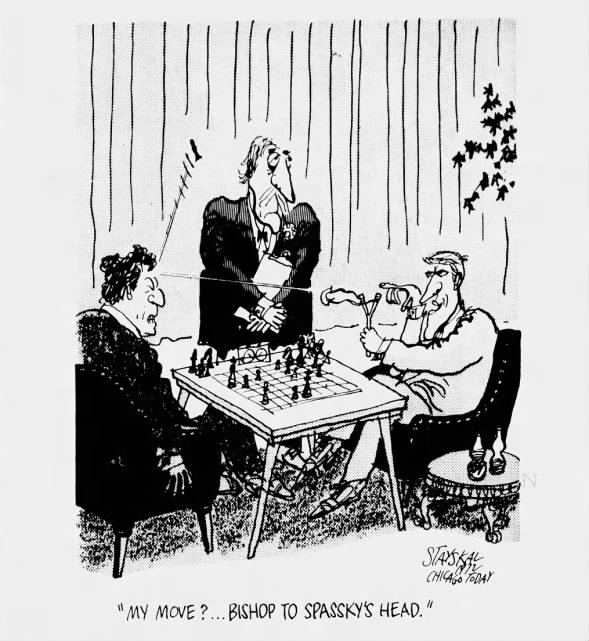 USSR Will Lose World Chess Crown and Packs Fabricated Anti-American Irrelevance Into World News 22 Jul 1972, Sat The Napa Valley Register (Napa, California) Newspapers.com
USSR Will Lose World Chess Crown and Packs Fabricated Anti-American Irrelevance Into World News 22 Jul 1972, Sat The Napa Valley Register (Napa, California) Newspapers.com
The Los Angeles Times Los Angeles, California Saturday, July 22, 1972 - Page 37
Letters: Fischer Defended
John Hall denounces chess as a “meaningless skill that has little to do with molding the destiny of the planet” and Bobby Fischer for “rudeness, egomania and childish tantrums.” Chess is no more a meaningless skill than baseball, football, basketball, golf, tennis and all sports and games. As for Fischer, his actions are responsible for about 500% improvement in playing conditions and prize money in tournaments. This is a competitive, capitalistic world and Fischer is another guy trying to make a buck, just like a Vida Blue, a John Hall.
Edgar F. Hurt Jr, Downey.
Fischer Defended
Despite John Hall's opinion, Bobby Fisher does have real courage. He prefers to analyze his adjourned games alone while his opponent has the assistance of four crack Russian chess analysts. He's fought stubbornly to upgrade playing conditions in chess tournaments. Through his exploits he has brought about a renaissance of chess interest in the United States.
Glenn E. Engebretsen, Playa Del Rey.












